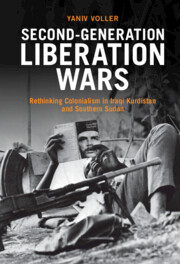Book contents
- Second-Generation Liberation Wars
- Intelligence and National Security in Africa and the Middle East
- Second-Generation Liberation Wars
- Copyright page
- Dedication
- Contents
- Acknowledgements
- Maps
- Abbreviations
- Introduction
- 1 Practices, Roles, Colonialism and Decolonisation
- 2 The Historical and Ideational Context of Postcolonial Liberation Wars
- 3 Postcolonial Governments and Counter-Insurgency
- 4 Second-Generation Liberation Strategies
- 5 Transition in Liberation: From Guerrilla Fighting to State-Building
- Conclusion
- Bibliography
- Index
1 - Practices, Roles, Colonialism and Decolonisation
Rethinking Postcolonial Separatist Wars
Published online by Cambridge University Press: 17 February 2022
- Second-Generation Liberation Wars
- Intelligence and National Security in Africa and the Middle East
- Second-Generation Liberation Wars
- Copyright page
- Dedication
- Contents
- Acknowledgements
- Maps
- Abbreviations
- Introduction
- 1 Practices, Roles, Colonialism and Decolonisation
- 2 The Historical and Ideational Context of Postcolonial Liberation Wars
- 3 Postcolonial Governments and Counter-Insurgency
- 4 Second-Generation Liberation Strategies
- 5 Transition in Liberation: From Guerrilla Fighting to State-Building
- Conclusion
- Bibliography
- Index
Summary
This chapter presents the theoretical framework for understanding the evolution of postcolonial liberation wars. The book uses theory as a lens through which to examine postcolonial liberation struggles. It employs ideas from theories of practices and roles in international politics to shed new light about the evolution of postcolonial separatist violence, and about our understanding of colonialism and decolonisation.
- Type
- Chapter
- Information
- Second-Generation Liberation WarsRethinking Colonialism in Iraqi Kurdistan and Southern Sudan, pp. 20 - 54Publisher: Cambridge University PressPrint publication year: 2022

